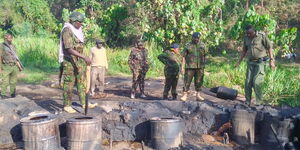Kenyan police officers deployed to the United Nations-backed mission in Haiti could be pocketing up to Ksh279,955 per month, inclusive of allowances, making their peacekeeping efforts financially rewarding.
Each officer stands to receive a monthly pay of Ksh182,242 from the international agency, with additional allowances boosting their earnings significantly.
During his vetting by the Appointments Committee on Thursday, August 1, President William Ruto’s nominee for the Ministry of Interior and Coordination of National Government, Prof. Kithure Kindiki, revealed that the police deployed to the troubled Caribbean country are being paid and insured by the United Nations.
Responding to questions about the deployment, Kindiki reassured, “Our officers are covered, insured, and paid for by the United Nations, and therefore there is no cause for alarm.”
Research reveals that these officers will earn $1,410 monthly, translating to approximately Ksh182,242 at the current exchange rate. This salary framework, approved by the UN General Assembly in June 2014, has remained in effect with slight increments over the years.
On top of this, the officers are entitled to a Mission Subsistence Allowance (MSA) of $756, adding Ksh97,713 to their monthly income.
The Kenyan-led mission, authorised by the United Nations Security Council in October 2023, includes 400 officers as part of a larger contingent of 1,000 Kenyan police committed to stabilising the violence-stricken Caribbean nation. The Multinational Security Support (MSS) mission, also backed by the United States, aims to restore law and order in Haiti.
The UN’s reimbursement framework, detailed on its official site under Peacekeeping Missions, outlines the pay structure for contributing countries. The General Assembly's resolution 68/281 approved a new rate of $1,332 per person per month, effective from 1 July 2014, with gradual increases to $1,365 in 2016 and $1,410 from 1 July 2017.
The Mission Subsistence Allowance (MSA) is a crucial component of the officers' compensation. According to the UN, MSA covers long-term living costs, including accommodation, meals, and miscellaneous expenses, incurred during duty in a field mission. The allowance is payable to non-staff personnel provided by a government to serve in individual capacities in UN missions, including peacekeeping operations, special political missions, and other field missions.
Kenyan officers deployed to Haiti will be drawn from the General Service Unit (GSU), Special Units, and the Border Patrol Unit (BPU). This deployment aims to reinforce efforts to restore order in Haiti, which has been plagued by gang violence and instability.
Prof. Kindiki commended the officers' efforts, stating, "It's also good to report good progress so far. The officers have recovered critical infrastructure, including the port, the airport, the main police station, and the hospital from the gangs. Some of the gang leaders who were defiant have now signed for peace and are willing to engage. Our officers are doing a commendable job. We are praying for them and hope for their continued success."












